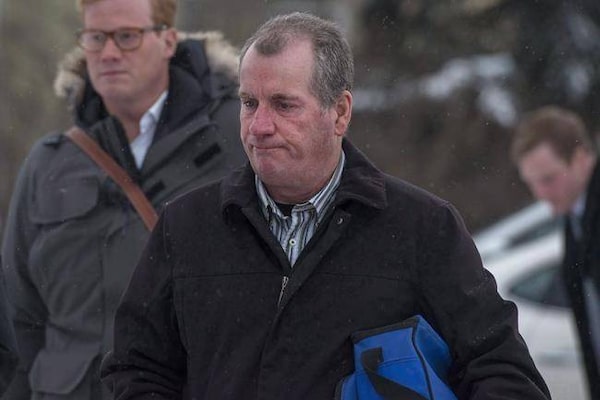
Gerald Stanley enters the Court of Queen's Bench for the fifth day of his trial in Battleford, Sask., on Feb. 5, 2018.Liam Richards
Saskatchewan's Crown prosecutions office said it will not launch an appeal of Gerald Stanley's acquittal of second-degree murder in the death of Colten Boushie.
Mr. Stanley, a 56-year-old farmer, was acquitted last month in a high-profile case that riveted the province and laid bare a racial divide between Indigenous and non-Indigenous peoples.
On Aug. 9, 2016, Mr. Boushie, a 22-year-old Cree man from the Red Pheasant First Nation, was shot and killed on Mr. Stanley's farm. Mr. Stanley acknowledged holding the firearm that killed him, but testified that the shooting was an accident. He was found not guilty of neither murder nor manslaughter by a 12-person jury in Battleford, Sask., a verdict that sparked protests across the country.
The case became a flashpoint as Prime Minister Justin Trudeau and Justice Minister Jody Wilson-Raybould expressed sympathy to Mr. Boushie's family and were criticized for speaking publicly on the case. Mr. Trudeau welcomed Mr. Boushie's relatives to a meeting on Parliament Hill days later.
At a media conference in Regina on Wednesday, Anthony Gerein, the province's assistant deputy attorney-general, said the Crown had found no legal basis on which to proceed with an appeal. "I know there is much sadness over the decision not to appeal," Mr. Gerain said. "There can be no appeal because the law doesn't allow it."
Mr. Gerein said the Crown's appeal could only have been based on an error in law that made a material difference to the case. It found no such grounds for an appeal.
Debbie Baptiste, Mr. Boushie's mother, was in tears moments after the announcement. She said she was frustrated and angry but would pursue justice for her son. "I will keep fighting and I am not going to stop," Ms. Baptiste said. She said she intends to launch a civil suit against Mr. Stanley for her son's wrongful death.
Chris Murphy, a lawyer for Mr. Boushie's family, said he believes the Crown made a mistake in deciding not to appeal. "They did not do the right thing," Mr. Murphy said. "There were legal errors that were made and there is a high degree of probability they had an impact on the case."
Mr. Murphy pointed to the defence's introduction of firearm evidence from lay people as a point of contention. He said the judge, Chief Justice Martel Popescul, had erred in his view by allowing the evidence to be introduced. He also did not provide a strong warning to the jurors about relying on that evidence, as opposed to the evidence of two qualified firearms experts, Mr. Murphy said.
"That evidence should never have been admitted," Mr. Murphy said. "The trial judge had an obligation to warn the jury of the danger of relying on their testimony."
Scott Spencer, the lawyer for Mr. Stanley, could not be reached for comment.
Perry Bellegarde, national chief of the Assembly of First Nations, called the Crown's decision a devastating blow to Mr. Boushie's family and "yet another indication to First Nations that Canada's justice system is failing them."
"This specific case exposed with glaring clarity some ugly aspects of racism and ignorance. We are deluding ourselves if we think that's not the case," Mr. Bellegarde said. "First Nations will not stand for injustice and Canadians should not stand for it, either."
Mr. Gerein, the province's head of prosecutions, said many people pored over the case, but there was no evidence that would have sufficiently supported an appeal. He said questions raised about the jury selection process, in which the defence used peremptory challenges to block potential jurors who appeared to be Indigenous, could not form the basis for an appeal.
David Tanovich, a law professor at the University of Windsor who followed the case closely, said he believes there are strong grounds for an appeal and he's disappointed the case will not be put before the appeal court. "The failure of the Crown to appeal and give the Court of Appeal a chance to review the case not only deprives the family and community of an opportunity for a second look at the process, but further serves to reinforce the view amongst some lawyers and others that this was a fair and unbiased process," Prof. Tanovich said in an e-mail.
Mr. Stanley still faces charges related to the improper storage of firearms.
A Saskatchewan RCMP town hall near the farm where Colten Boushie was fatally shot in 2016 heard from rural residents on Monday about protecting their property. Police said residents shouldn't take matters into their own hands.
The Canadian Press
 Joe Friesen
Joe Friesen